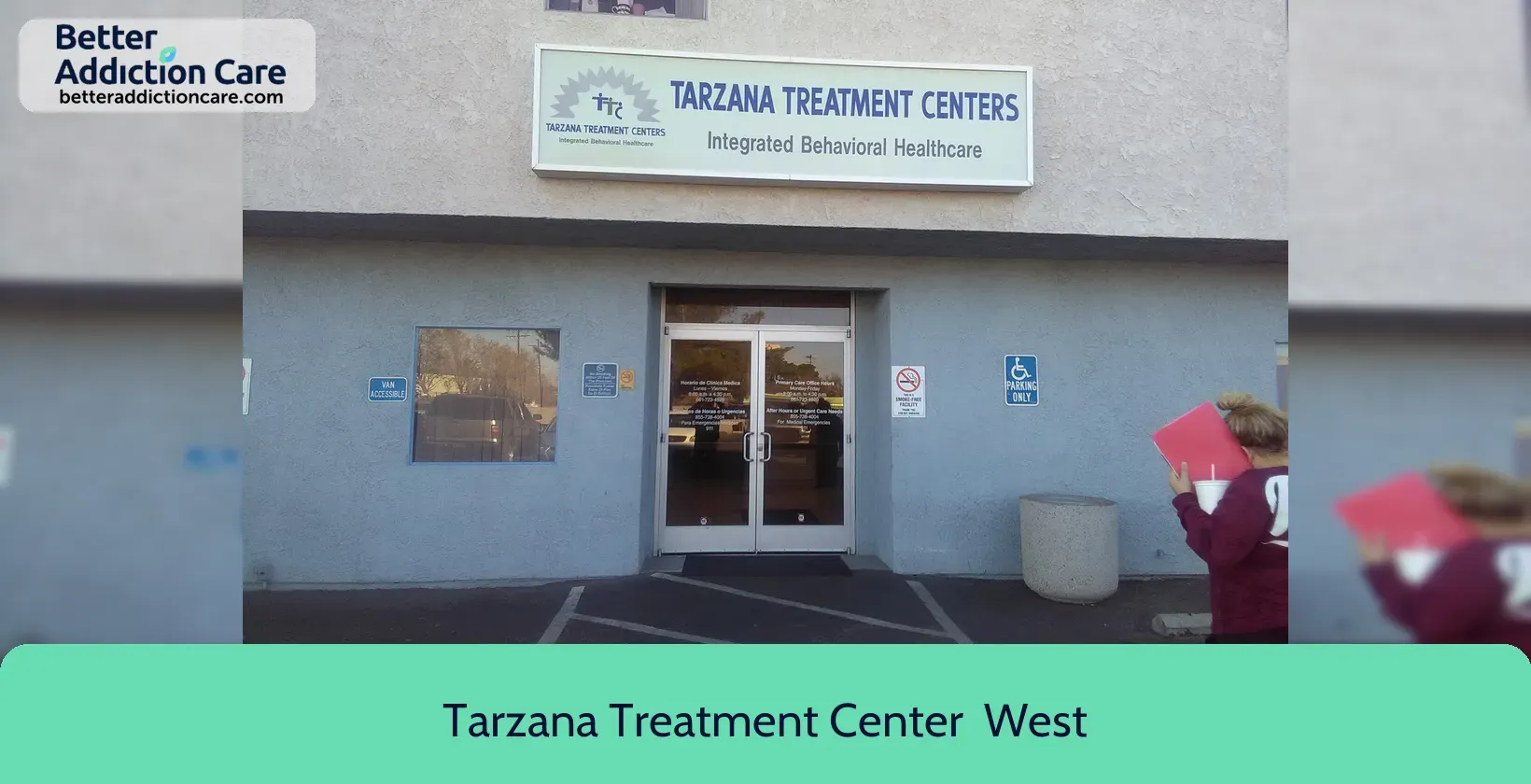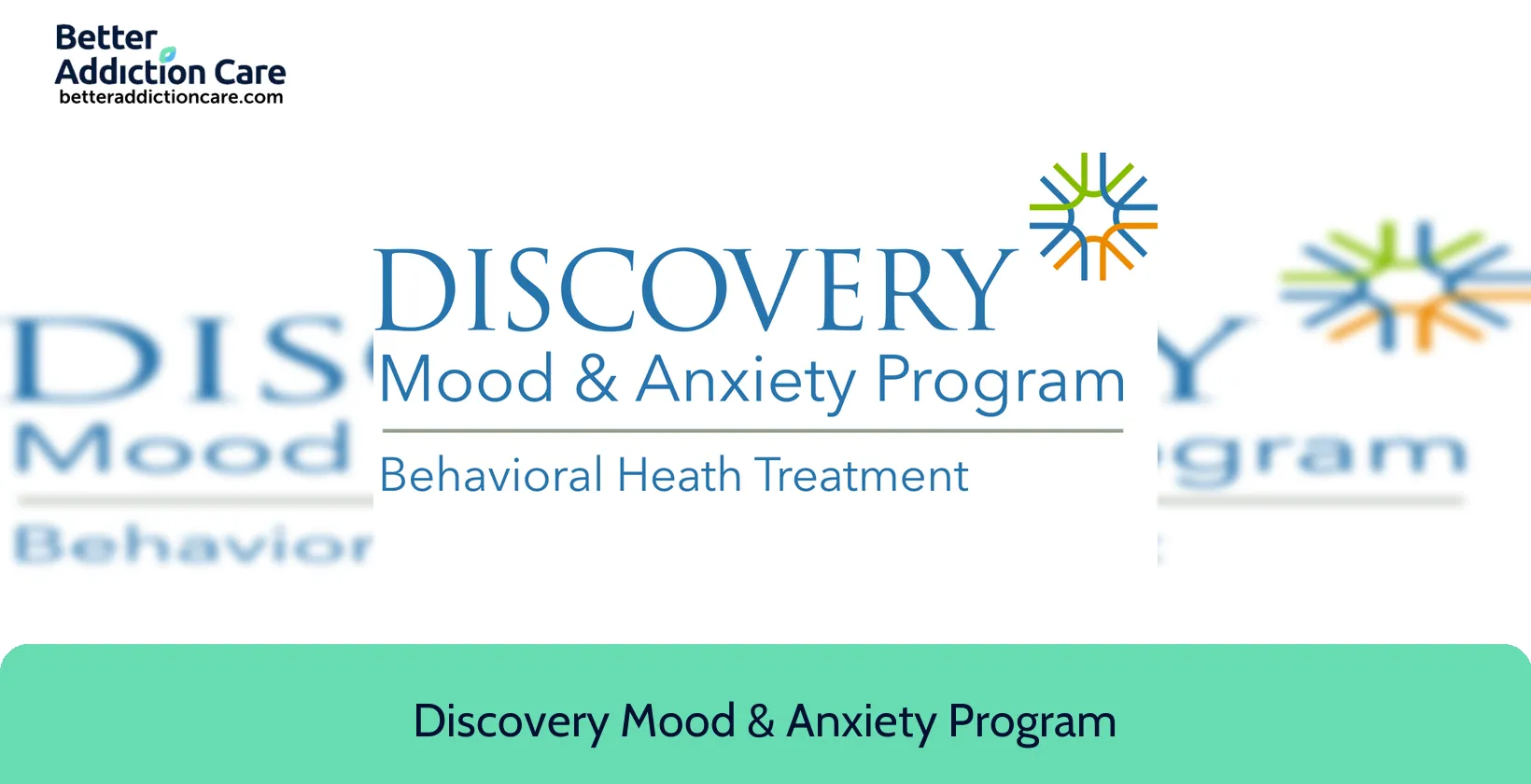Narcotics Anonymous (NA): Definition, How It Works, and Outcome
Narcotics Anonymous (NA) offers a supportive and welcoming path to recovery if you are struggling with drug addiction. NA is a nonprofit fellowship dedicated to helping individuals stop using drugs and maintain long-term sobriety. With thousands of meetings held across the U.S., it provides a free and accessible resource for those seeking help.
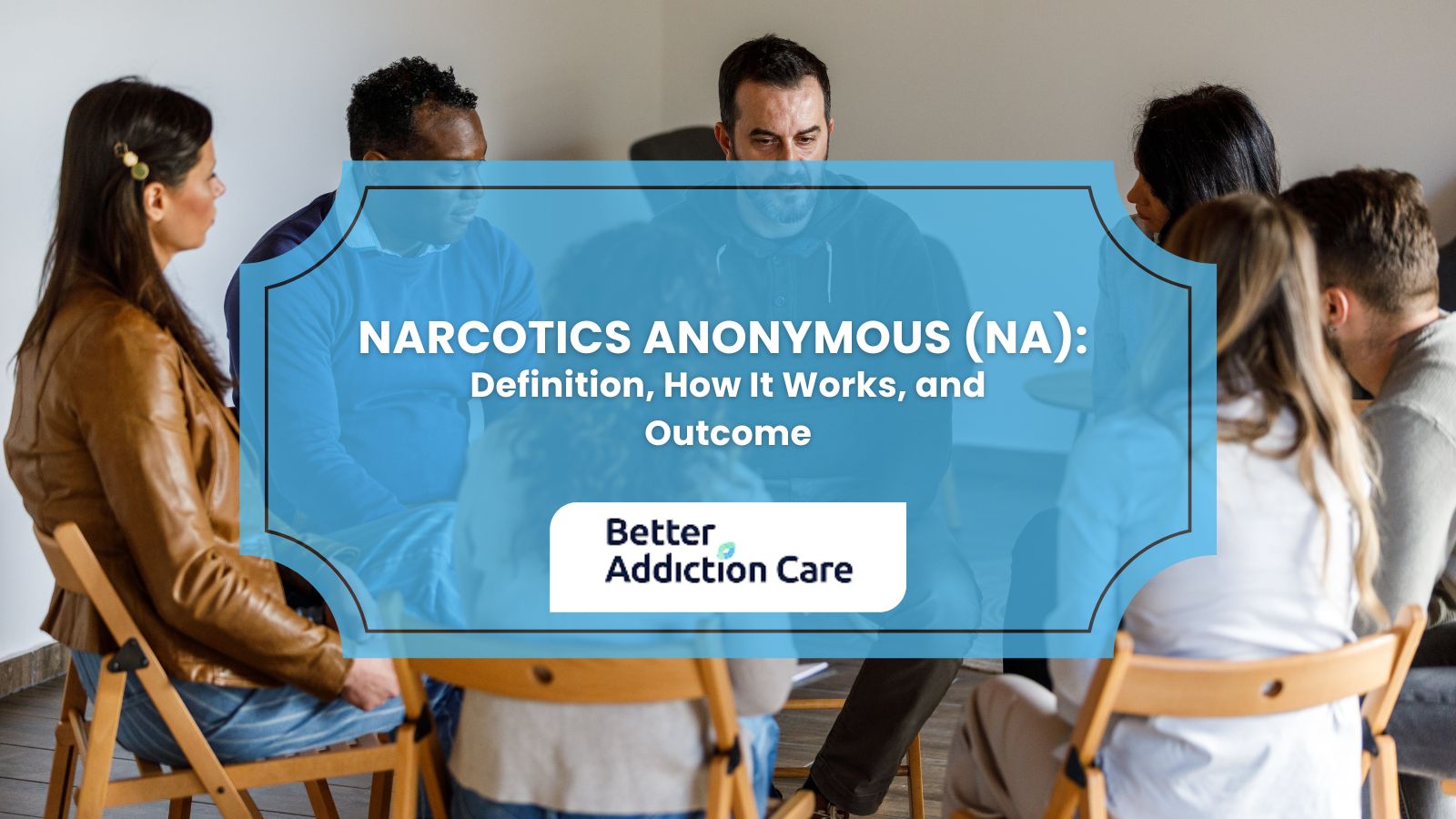
NA operates through a 12-step program that encourages personal growth, accountability, and peer support. Regular group meetings offer a safe space where members share experiences and build connections that strengthen recovery.
A 2006 BMC Psychiatry study following 114 treatment patients found that engagement in self‑help groups was associated with a 12.6-fold higher odds of abstinence. Many find lasting sobriety through consistent participation and commitment. NA is an important part of a broader addiction treatment plan, complementing counseling and clinical care. For individuals with co-occurring mental health issues, NA provides community support while professionals address psychiatric needs. Combining fellowship with professional treatment enhances the chances of recovery and supports a healthier, drug-free life.
What Is Narcotics Anonymous (NA)?
Narcotics Anonymous (NA) is a peer-led addiction recovery group that helps individuals stop using drugs and maintain sobriety. Founded in 1953, NA was created as an extension of Alcoholics Anonymous to support people recovering from narcotic and other substance use. Its mission is to provide a supportive, nonjudgmental space where members recover through shared experience and accountability. NA follows a structured 12-step program focused on personal growth, responsibility, and spiritual development. It operates worldwide, with meetings in over 140 countries. As a free and accessible resource, NA offers a vital support system for individuals seeking long-term recovery.
Who Does Narcotics Anonymous Aim to Help?
Narcotics Anonymous (NA) aims to help anyone with drug addiction, offering support at every stage of recovery. Its inclusive approach ensures that people from various backgrounds and experiences find understanding, encouragement, and community through its 12-step program.
The following groups are among those NA aims to support:
-
Adults struggling with drug addiction seeking support and recovery.
-
Teens and young adults who are battling substance use need a peer-led recovery environment.
-
Individuals with substance use disorders, regardless of the specific substance involved.
-
People with co-occurring mental health issues, as a complement to professional treatment.
-
Family members and loved ones who attend open meetings to better understand addiction and recovery.
Is Narcotics Anonymous Exclusively for Narcotics?
No, Narcotics Anonymous (NA) is not exclusively for narcotics. NA supports recovery from all forms of substance abuse, including alcohol addiction, prescription drug misuse, and poly-drug use. Many members join NA to recover from multiple substances, not just narcotics, making it a welcoming and inclusive space for anyone seeking freedom from addiction.
How Is Narcotics Anonymous Different From Alcoholics Anonymous (AA)?
Narcotics Anonymous (NA) is different from Alcoholics Anonymous (AA) mainly in its focus and language. While AA centers specifically on alcohol addiction, NA addresses recovery from all types of substance use, including narcotics, alcohol, and other drugs. NA uses more inclusive language like “addiction” rather than “alcoholism,” making it accessible to individuals with poly-drug use or multiple substance dependencies.
Is Narcotics Anonymous Connected to Religion?
No, Narcotics Anonymous (NA) is not connected to any religion. While the program includes spiritual principles and encourages belief in a “higher power,” it does not promote any specific faith or religious practice. NA is designed to be inclusive, allowing members of all beliefs, or none at all, to define their understanding of spirituality as it relates to their recovery.
Is Narcotics Anonymous Free to Use?
Yes, Narcotics Anonymous (NA) is completely free to use. It is funded by voluntary contributions from members and does not charge fees or require insurance. NA welcomes everyone, regardless of financial status, making it an accessible support option for anyone seeking recovery from addiction.
Can You Join Narcotics Anonymous Meetings Online?
Yes, you can join Narcotics Anonymous (NA) meetings online. Virtual meetings have become increasingly common, offering accessible support for individuals who cannot attend in person due to distance, health, or scheduling. These meetings follow the same 12-step format and provide a real-time connection with others in recovery.
How Does Narcotics Anonymous Work?
Narcotics Anonymous (NA) works through a peer-driven structure centered on regular group meetings and the 12 steps of recovery. Members attend meetings where they share experiences, offer mutual support, and build accountability in a nonjudgmental environment. The 12-step guide individuals through a process of self-reflection, acceptance, making amends, and personal growth. As a peer-led organization, NA is run by volunteers, people in recovery who help others through shared experience and mentorship. This community support is a key part of what makes NA effective, offering both structure and a strong sense of connection for those working toward sobriety.
What Are the 12 Steps of Narcotics Anonymous?
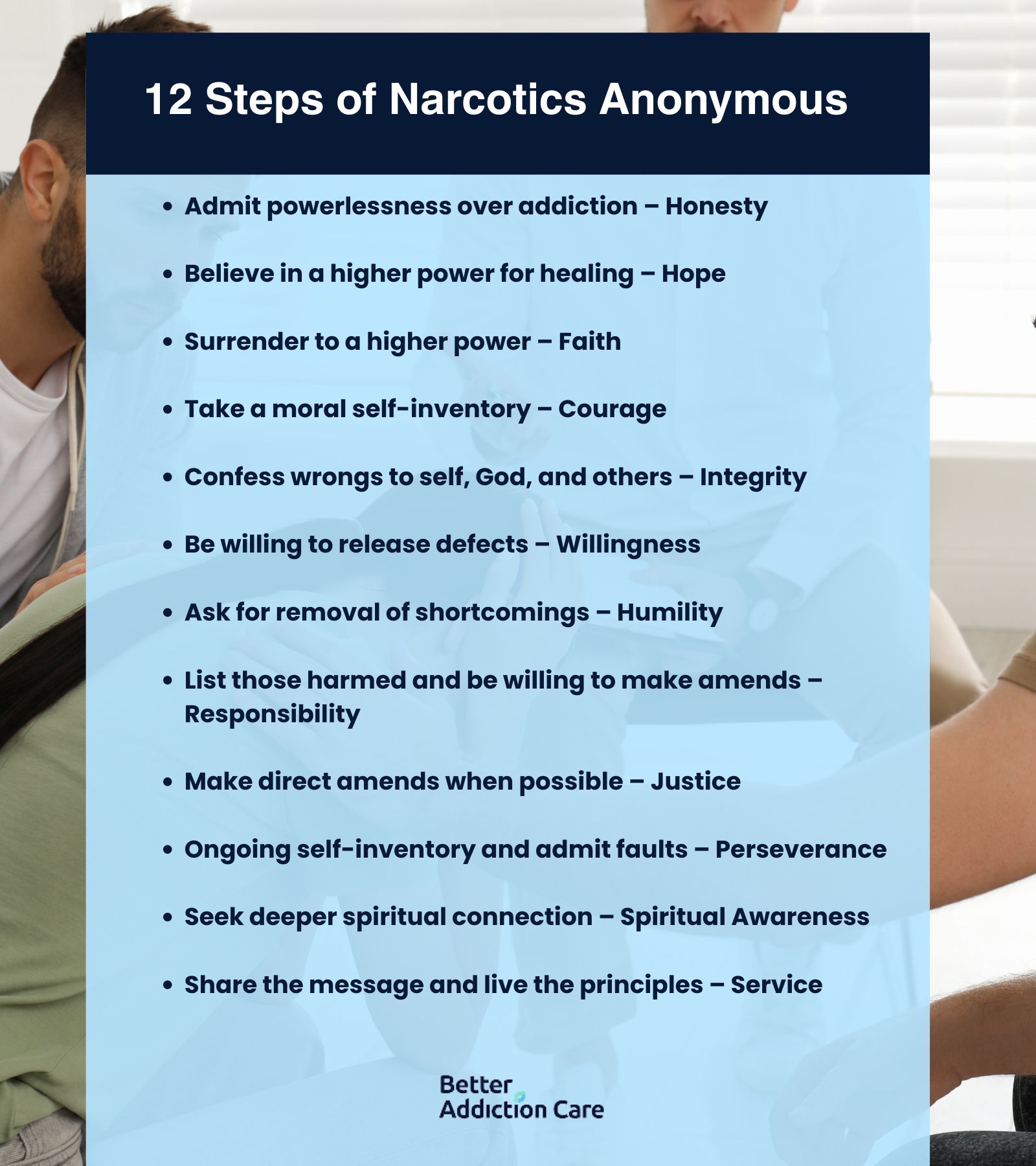
The 12 steps of Narcotics Anonymous (NA) are paired with a spiritual principle that helps deepen self-awareness and strengthen character. These steps encourage individuals to confront their addiction, take responsibility for their actions, and build a meaningful life in recovery. Together, they support lasting change and community healing.
The 12 steps are:
-
We admitted we were powerless over our addiction, that our lives had become unmanageable.
Principle: Honesty. Recovery begins with acknowledging the problem. -
We came to believe that a Power greater than ourselves restores us to sanity.
Principle: Hope. Opens the door to healing through spiritual belief. -
We decided to turn our will and our lives over to the care of God as we understood Him.
Principle: Faith. Encourages trust in something beyond ourselves. -
We made a searching and fearless moral inventory of ourselves.
Principle: Courage. Promotes honest self-examination. -
We admitted to God, to ourselves, and to another human being the exact nature of our wrongs.
Principle: Integrity. Builds accountability and truthfulness. -
We were entirely ready to have God remove all these defects of character.
Principle: Willingness. Expresses openness to personal change. -
We humbly asked Him to remove our shortcomings.
Principle: Humility. Accepts that growth requires help. -
We made a list of all persons we had harmed and became willing to make amends to them all.
Principle: Responsibility. Takes ownership of past actions. -
We made direct amends to such people wherever possible, except when to do so would injure them or others.
Principle: Justice. Seeks to restore relationships and repair harm. -
We continued to take personal inventory, and when we were wrong promptly admitted it.
Principle: Perseverance. Supports ongoing self-awareness and correction. -
We sought through prayer and meditation to improve our conscious contact with God as we understood Him.
Principle: Spiritual Awareness. Deepens connection and guidance. -
Having had a spiritual awakening as a result of these steps, we tried to carry this message to addicts and to practice these principles in all our affairs.
Principle: Service. Encourages giving back and living the program daily.
What Happens During an NA Meeting?
During a Narcotics Anonymous (NA) meeting, members gather in a supportive and confidential setting to share their experiences, challenges, and progress in recovery. Meetings begin with readings from NA literature, followed by open sharing or guided discussions focused on topics related to addiction and personal growth. Everyone is encouraged to speak, but sharing is always voluntary. The atmosphere is grounded in fellowship, where mutual respect and confidentiality are key values. This peer support helps members feel understood and less alone, creating a sense of belonging that is vital to long-term recovery. Meetings are speaker-led, discussion-based, or focused on specific steps or traditions, but all are designed to foster connection, healing, and personal accountability.
What Role Do Sponsors Play in NA?
Sponsors play a role in NA by guiding members through the 12-step program. Sponsors help sponsees navigate the steps, understand NA principles, and stay focused on their recovery goals. This relationship fosters personal accountability, as sponsees regularly check in with their sponsor and discuss challenges, progress, and spiritual growth. While sponsors are not therapists or professionals, their lived experience and commitment to the program make them valuable mentors in the recovery journey.
Do Newcomers Have to Share Their Stories in NA Meetings?
No, newcomers do not have to share their stories in Narcotics Anonymous (NA) meetings. Sharing is always optional, and first-time attendees are welcome to simply listen and observe. NA fosters a welcoming and nonjudgmental environment where individuals feel comfortable at their own pace.
What Are the Outcomes of Participating in Narcotics Anonymous?
The outcomes of participation in Narcotics Anonymous (NA) include improved relationships, mental clarity, and long-term sobriety. A 24-month study by Fiorentine (1999) found that individuals who attended NA or similar meetings weekly had a 77% abstinence rate, compared to 56% for less frequent attendees. Another 2006 BMC Psychiatry (John-Kåre Vederhus, et al.) study showed that 81% of regular self-help group participants remained drug-free after two years, versus only 26% of non-participants. These outcomes highlight the effectiveness of the 12-step model in supporting recovery.
How Does NA Measure Long-term Recovery Success?
Narcotics Anonymous measures recovery success through personal growth, sustained abstinence, and improvements in quality of life rather than fixed clinical metrics. As a peer-led fellowship, NA does not formally track member data, but long-term recovery is recognized through sobriety milestones, such as 30 days, 1 year, or multiple years clean, celebrated within meetings. Success metrics include enhanced relationships, emotional stability, and commitment to service.
Can Narcotics Anonymous Replace Drug Rehab?
No, Narcotics Anonymous (NA) can not replace drug rehab. It is a complementary support system that works best alongside clinical care, such as counseling, therapy, or medication-assisted treatment. Combining NA with professional treatment leads to higher long-term recovery rates than using either approach alone.
Are There Specialized NA Groups for Veterans, LGBTQ+, or Youth?
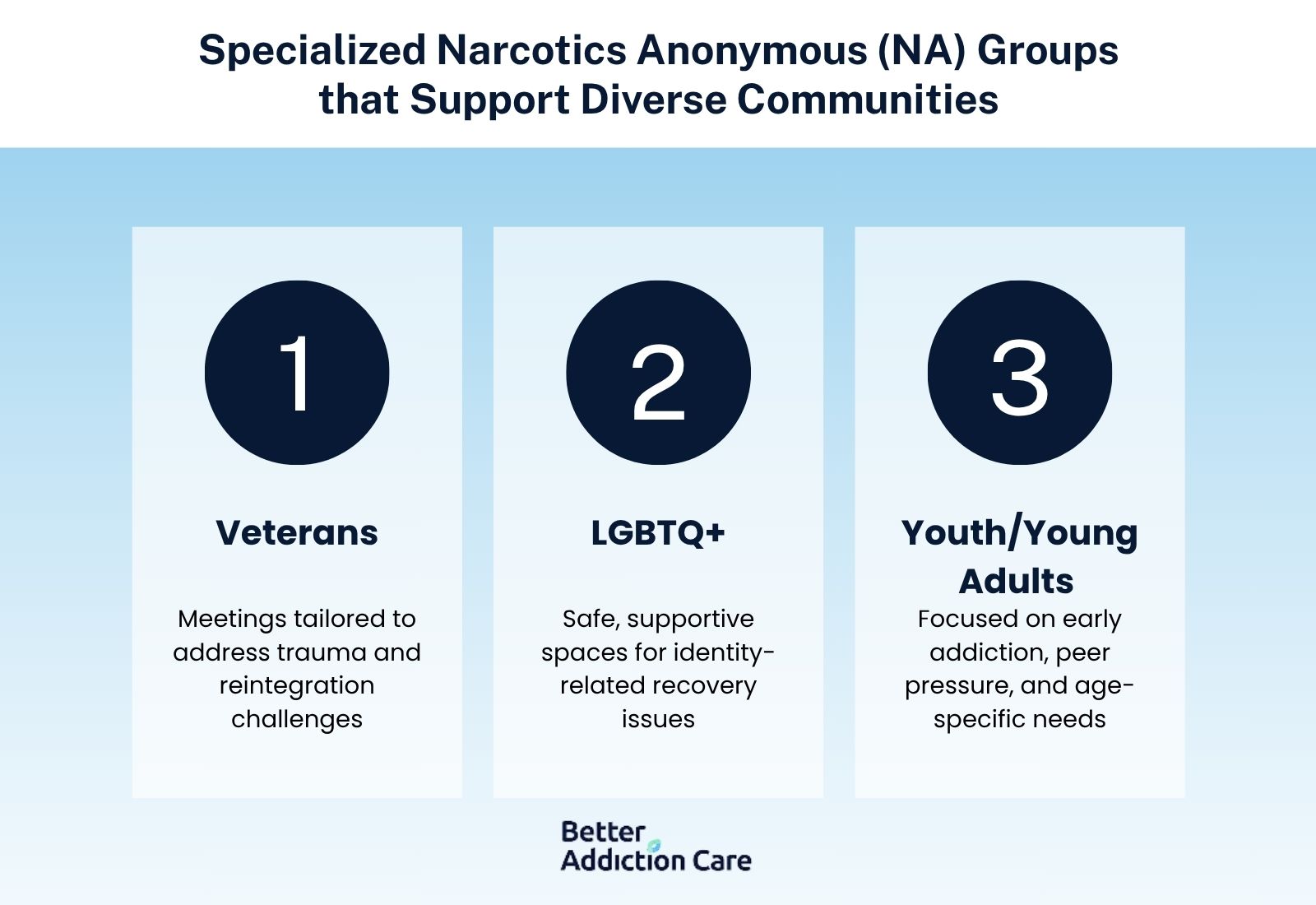
Yes, there are specialized Narcotics Anonymous (NA) groups that support diverse communities while maintaining their inclusive, open-to-all approach:
-
Veterans: Some NA groups provide veteran-focused meetings that address military-related trauma and reintegration challenges.
-
LGBTQ+: LGBTQ+-friendly meetings offer safe spaces to discuss identity-related recovery issues without judgment.
-
Youth and Young Adults: Youth-specific meetings cater to younger members facing early-stage addiction and peer pressure.
NA’s inclusivity policy welcomes anyone with a desire to stop using drugs, regardless of age, background, or identity.
How Does NA Differ from Outpatient Drug Rehab?
Narcotics Anonymous (NA) is a free, peer-led support group based on the 12-Step model. It offers ongoing community support, accountability, and spiritual guidance for individuals recovering from drug addiction. Meetings are anonymous, non-clinical, and open to anyone seeking recovery, regardless of the type of drug used.
In contrast, outpatient drug rehab is a structured, professional treatment program provided by licensed clinicians. It typically includes individual therapy, group counseling, medication management, relapse prevention planning, and support for co-occurring mental health conditions. Outpatient rehab follows a scheduled plan and often lasts from a few weeks to several months.
While NA offers long-term support and fellowship, outpatient rehab provides clinical care and evidence-based treatment. Many people benefit from combining both for a more comprehensive recovery plan.
How to Integrate NA into Addiction Treatment Plans?
Integrating Narcotics Anonymous (NA) into an addiction treatment plan involves combining it with therapy, medication-assisted treatment (MAT), and professional counseling. For example, individuals on Suboxone attend NA meetings to build peer support while addressing emotional and behavioral issues in therapy. Treatment providers include NA in aftercare plans to reinforce coping skills and provide ongoing accountability. This holistic approach supports both the medical and social aspects of long-term recovery.
How Does NA Handle Relapses and Mental Health Challenges?
Narcotics Anonymous (NA) handles relapse and mental health challenges with peer-driven, nonjudgmental support that fosters emotional resilience. Members who relapse are welcomed back and encouraged to share their experiences to strengthen recovery. NA meetings address co-occurring issues like anxiety or depression through shared experiences and practical support. Research shows that peer support reduces relapse risk and improves emotional well-being. With up to 64% of people with opioid use disorder also facing mental illness, NA offers a vital space for ongoing support alongside clinical care.
What Role Does Spirituality Play in Recovery Through NA?
The role spirituality plays in recovery through Narcotics Anonymous (NA) by encouraging a personal connection to a “higher power,” defined individually by each member. This concept fosters humility, hope, and emotional growth, without requiring religious belief. It helps members find meaning and strength in their recovery journey, making NA accessible to people of all faiths or none.
How Do NA Members Reconcile Diverse Beliefs With Program Spirituality?
NA members reconcile diverse beliefs with the program’s spirituality by interpreting the concept of a “higher power” in personally meaningful ways. This inclusivity allows people of all faiths, spiritual paths, or none to engage in recovery through personal spirituality rather than religious doctrine.
Related Articles
Treatment Centers in California
